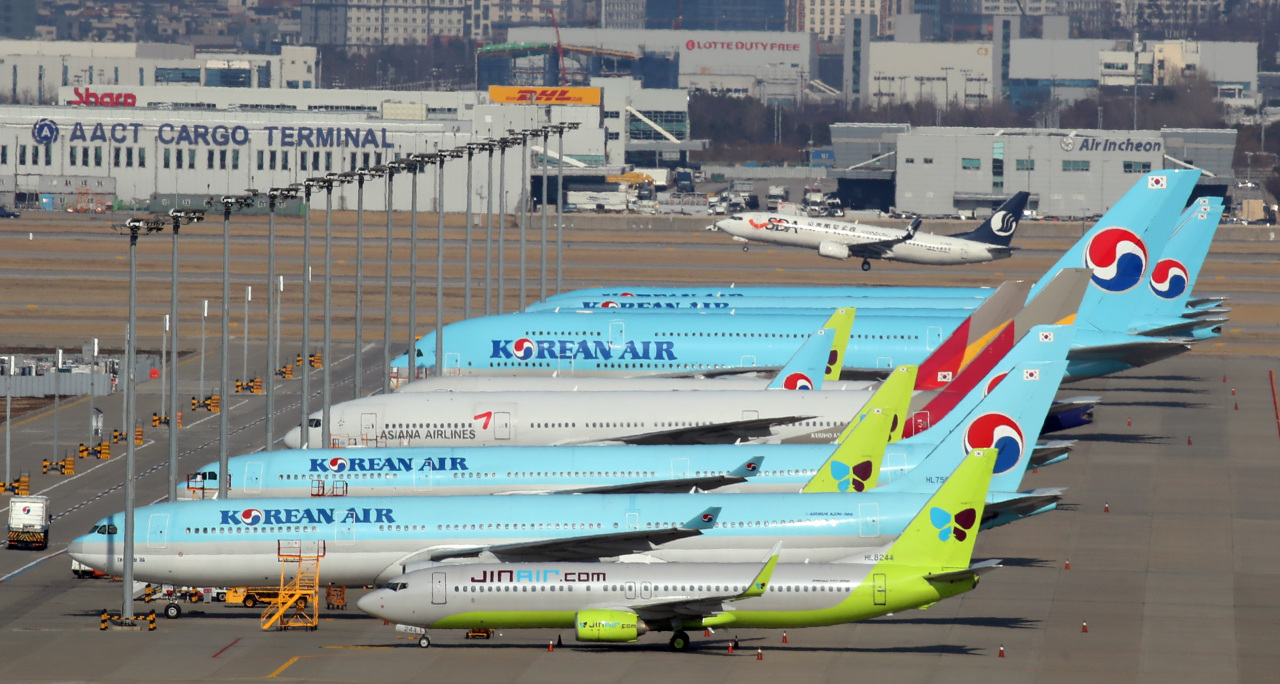82 countries, regions restricting entry from S. Korea over coronavirus fears
By YonhapPublished : March 2, 2020 - 21:37

A total of 82 countries and regions are imposing entry bans or quarantine procedures on visitors from South Korea over new coronavirus fears on Monday, despite Seoul's beefed-up diplomacy to prevent inordinate measures targeting its citizens.
As of 7 p.m., 36 countries and regions plan to ban or are barring the entry of travelers who have visited South Korea in the past two weeks, while 46 countries and regions, including China, are implementing quarantine procedures for them, according to the foreign ministry.
The number of COVID-19 infections in South Korea has risen to 4,335 with 26 deaths, and the country is speeding up the testing process under an all-out campaign to stem the virus' spread.
Russia's far eastern island of Sakhalin said it will quarantine foreigners who have traveled to South Korea, China and Japan for 21 days if they have coronavirus symptoms. Those without the symptoms are subject to self-quarantine for 14 days.
New Zealand was also added to the daily tally of the 46 countries enforcing quarantine measures against Koreans. The country now puts visitors who have traveled to South Korea or northern Italy in the past two weeks under a 14-day self-quarantine.
Maldives plans to enforce an entry ban on those from South Korea's southeastern city of Daegu, seen as a cluster of infections, and other regions, starting Tuesday. But it has decided not to bar the entry of those from Seoul, a foreign ministry official said.
In Sunday's tally, Angola was classified as a country enforcing both an entry ban and quarantine measures for visitors from Korea.
But on Monday, the African country was listed only as a state imposing the entry ban.
Pointing to the recent increase in entry restrictions, a senior Seoul official has said that relatively vulnerable countries with weak heath care systems appeared to have taken preemptive containment measures.
"The countries with vulnerable quarantine capabilities are anxious as they may find it difficult to put the virus under control if it flows in, and thus there has been an increase in the number of countries that have taken preemptive measures," the official said.
"But the United States and Western Europe, except for Britain ... They have few restrictions," he added.
In China, 14 provinces and cities, including Beijing and Shanghai, have enforced strong quarantine measures against travelers from South Korea or parts of the country such as Daegu that have reported a cluster of virus infections.
The U.S. has yet to impose any entry restrictions for South Koreans. But the State Department has raised its travel advisory for Daegu to the highest level, which urges its people not to travel, citing the level of community spread of the virus.
U.S. President Donald Trump said Sunday that people arriving in the U.S. "from certain designated high-risk countries or areas within those countries" will be screened both before leaving the country and when arriving.
Seoul has been beefing up diplomacy to persuade countries to not enforce entry restrictions, stressing its capacity to contain the virus.
Foreign Minister Kang Kyung-wha has held a series of phone talks with her foreign counterparts or related officials to urge their countries to trust Seoul's quarantine efforts and not to take any "excessive measures."
Among her interlocutors were her Canadian and UAE counterparts, Francois-Philippe Champagne and Sheikh Abdullah bin Zayed Al Nahyan. She also talked to U.S. Deputy Secretary of State Stephen Biegun while Secretary of State Mike Pompeo was on an overseas trip.
The foreign ministry is also in talks with dozens of countries, which have banned the entry of people from South Korea, to explore ways to enable businesspeople here to travel to those countries.
Of the 231 South Koreans stranded at Istanbul Airport, 154 left for Seoul via a third country while the remaining 77 are set to head home later in the day, a South Korean diplomat in Istanbul said.
Turkey suspended all flights to and from South Korea, Italy and Iraq on Sunday.
On Monday, the foreign ministry in Seoul summoned a senior Turkish Embassy official and expressed regrets about the flight suspension. The ministry requested the country's cooperation in ensuring the South Koreans' safe and prompt repatriation.
The Czech Republic also decided to halt flights to and from South Korea and northern Italy for two weeks, while Air India cut the number of its New Delhi-Incheon service in half to two times a week.
Separately, Land, Infrastructure and Transport Minister Kim Hyun-mi expressed regret to her Vietnamese counterpart in a letter over the Vietnamese authorities' ban on landing in Hanoi by an Asiana Airlines flight.
The Asiana flight turned back to South Korea on Saturday, about two hours after departing for Hanoi, as Vietnam requested the plane land at Van Don International Airport, around 140 kilometers away from Noi Bai International Airport in Hanoi.
Kim called the Vietnamese move "a serious safety issue." (Yonhap)












![[Today’s K-pop] BTS pop-up event to come to Seoul](http://res.heraldm.com/phpwas/restmb_idxmake.php?idx=644&simg=/content/image/2024/04/17/20240417050734_0.jpg&u=)





![[KH Explains] Hyundai's full hybrid edge to pay off amid slow transition to pure EVs](http://res.heraldm.com/phpwas/restmb_idxmake.php?idx=652&simg=/content/image/2024/04/18/20240418050645_0.jpg&u=20240418181020)

![[Today’s K-pop] Zico drops snippet of collaboration with Jennie](http://res.heraldm.com/phpwas/restmb_idxmake.php?idx=642&simg=/content/image/2024/04/18/20240418050702_0.jpg&u=)